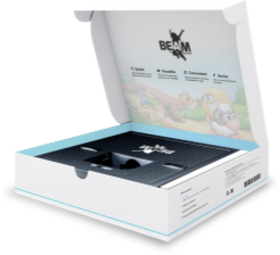Yair Ariel • April-4-2017
Churn is a problem that almost every industry has to face. But Family Entertainment Centers are hit the hardest when it comes to retention of employees. Ask any resource manager and he will quote “18 months” as a golden number. That is less than two full seasons. Some joints may experience churn rates that are higher than 40%. Given the increasing awareness of patrons where safety measures and overall FEC quality is concerned and the revised minimum wages (with the new overtime stipulations), replacing a fully trained worker is akin to purposely reducing the productivity of the team with a member who can’t keep up and may not be good ROI. But if you follow these great steps to build a rockstar FEC team, your positive experience will keep your employees and customers longer!

13 steps building rock star FEC team
13 Proven Steps to build a rockstar FEC team that keeps the joint lively & profitable
The solution?
Taking FEC team building just as seriously as the introduction of new attractions or the revamping of the menu.
Great Teams Are Built Through Robust Interview Processes
Word of mouth and referrals still work in the FEC circuit. In fact many brands like to give preference to candidates who are brought in by existing employees because they are less likely to be “runners” who put in a month’s work and then shift loyalties for the slightest possible increase in pay.
But times are changing.
Interviews need to get more focused and there have to be processed in place to appropriately reward references that add to the profitability of the center.
- First and foremost the job descriptions have to be thorough. FECs should include screening questions that separate those who are obviously unqualified from the ones who can be considered. A common screening question is “Are you open to a drug test?” Most joints don’t really go through with the actual test but the mere mention of the possible cuts down the number of applicants, encouraging only the candidates who are confident of their track record and their sobriety to proceed.
Position Analysis Questionnaires (PAQs) are used by recruiters to find potential employees who possess what is needed to excel in the job. While a full-fledged PAQ is out of the question for FECs, the management must keep in mind that a good team leverages the strengths of its members.
This involves putting individuals who are adept at socializing in charge of the ticket counter where they can capitalize on their gift of gab and using the quiet but organized thinkers to run the ritualistic morning safety checks.
A simple listing of the duties should be accompanied by the qualities required to render them so that candidates can ascertain their fit and only apply for the positions that are aligned with their personalities.
- A masterstroke is to highlight the value proposition of the FEC in the job descriptions. No worker is an independent unit. The vibrancy of a Family Entertainment Center or its ambiance is a major part of its appeal. An FEC displays character only when employees resonate with what the park stands for. If emulating the PAQ ensures ability fit, the value proposition describes the essence of the center and ensures a moral (or values) fit.
This is equally important.
- Coming in at three is the best practice of looking in the right places. FECs shouldn’t set themselves up for disappointment. Advertising in college newspapers is likely to attract more capable candidates but these students are set to work in big firms and likely have lofty ambitions. They obviously leave as soon as they clinch a prestigious internship.
On the other hand, high school potentials haven’t really made up their minds about their future course of action. If they like the setting of the FEC they might stick with the gig right through college, putting in 3 to 4 years and earning extra money during the holidays. Loyalty plays is an influencer here.
- Face to face interviews boosts the chances of assembling a cohesive unit that is efficient and dedicated to FEC profitability. But throwing in a pre-interview chat with the hopefuls can help the selection committee do a better job of recruiting individuals who can get the work done. Obvious no-nos like a sullen demeanor and poor diction is spotted in the pre-interview and this allows FECs to make more informed decisions without having to go through the whole process with someone who can’t render the duties.
Training Plays an Important Role Too
An FEC employee is only as good as the training he receives. Did we mention the importance of training?
Many Family Entertainment Centers are guilty of what is known as the “chuck and duck” training in which a new entrant is asked to “follow the job” with a veteran in the hope that hands-on experience can prove to be more valuable than traditional instructions.
If a worker is viewed as a one-dimensional entity – whose existence is gauged by the physical tasks he accomplishes – then this approach may work.
But a rockstar team displays great bonding, confidence and a sense of accountability. The role of the right kind of training in this regard can’t be overemphasized.
- Proficient employees do not make the best trainers. If an individual is naturally great at something, he struggles to identify the pitfalls that may trip someone else up. Effective training enables trainees to cope with any situation and really master a skill from the ground up.
Professionals who know how to impart knowledge and instructions are best suited to this job. They allow candidates to gradually build confidence and hit the ground with the ability to tackle the highs as well as the lows. Unless each link in the chain is strong, it can break and jeopardize the entire operation. FECs have to view training as an investment that keeps paying dividends.
- Interactive content is essential to drive retention. Don’t subject new recruits to endless hours of video watching. They will end up overwhelmed and demoralized. The onboarding of team members has to include videos, powerful Keynote presentations and hands-on experiences. This variety optimizes the impact of the information and facilitates its delivery through suitable formats.
Go-Karting safety procedures may be best shared through a video but the actual checklist of what has to be done each morning to declare the karts “safe” can be circulated as a PDF or even a physical document.
- Reinforcements during the probationary period. Studies show that onboarding impacts churn greatly. In fact 80% of employees are subconsciously primed to quit within 60 days of joining. They may take the action later down the line but the impetus is generated during onboarding. Since first impressions are generally the most profound, don’t haunt workers with the threat of the stick. Give them the compliments instead.
Yes, they will make mistakes. Maybe quite a few. And they must be rectified. But presenting their shortcomings as discussions instead of accusations makes a world of difference. Praise what they have done right and offer suggestions to help them do better.
Probationers who are happy and confident of their abilities during onboarding mature into assets for the company.
Ultimately Culture is What Seals the Deal
Hiring the right people helps.
Orienting them properly helps.
But as with any venture, it all boils down to how employees “feel” about working at the FEC every day.
Company or brand culture is the glue that holds a team together and transforms a group of individuals into a well-aligned, disciplined and genuinely satisfying unit.
FECs need to understand that their business comprises of people and pleasing them is the priority. Under such circumstances, the asset or resource closest to the patrons is the ground crew in particular and the team in general.
Happiness is infectious. It spreads from lively employees to customers bringing a smile to their faces.
The following recommendations can make a positive difference.
- Inspire trust. Employees must feel that they are associated with a brand that practices what it preaches. If an FEC’s value proposition focuses heavily on quality yet the food pantry is rarely inspected for sanitary standard compliance the message that workers get is “dissimulation” instead of transparency.
Without even realizing it they may start fearing for their future and suffer from insecurity. This is bound to drive quits.
- Incentivize. Reward great performance. Reward initiative. Reward engagement. And do it without introducing cash prizes. Motivation is rarely fuelled by money. And even if the trick works, the rewards are temporary. Instead lead with bonuses like gift cards or extra paid leaves. Even “Employee of the Month” badges supported by a few tokens of appreciation can keep the friendly competitiveness alive.
- Encourage team-building activities. The American Psychological Association (APA) accepts that bonding amongst team members helps them feel more valued and appreciated. Parties, communal meals, excursions are a few ways in which workers get to know each other better, understand the core strengths of the team and empathize with peers eliminating underhandedness and office politics from the equation.
- A thriving team culture rests on the bedrock of feedback and reviews. FEC employees are Millennials. And these are people who set a great store by work satisfaction. They want to be involved in building something of value from scratch. Paying appropriate attention to and considering their feedback not only injects FECs with new ideas, it also strengthens individual confidence, morale and overall team performance.
Should reviews be chucked? Not really. But evaluating an employee’s competence every 11 months is not a good way to keep track of skill upgrades or resolve grievances. Instead, stay interviews must be conducted every three months where workers talk about what they need from the management to improve their efficiency and in return are given constructive suggestions that can take their contributions to the next level.
- Fostering ownership is something very few FECs think of. Yet it is a surefire way to build a rockstar team. Employees must feel that they have a stake in the business. Even issuing a single penny stock to each worker is a great move that triggers the feeling of “being accountable and in charge”. Teams should be assigned goals for the season, given guidelines and also the flexibility to make spot decisions about certain aspects of the business like prizes and bonus rides. They should realize that dazzling and delighting patrons is in their hands. And they can turn visitors into evangelists by making their day.
- Processes are dry but useful. No one loves “processes”. They sound mundane. But the truth is, processes are the beating heart of productivity. A great team is great at following processes to take care of critical and repetitive tasks. Rituals like morning safety checks and food counter brush downs don’t call for re-inventing the wheel. They require precise actions taken without hesitation. When team members have these tasks down pat they feel in control and can spend more time working in concert and focusing on improving output.
Processes save FECs lawsuits, mishaps and help them operate as per the schedule.
A rockstar FEC is the end result of multiple rounds of vetting, encouragement, evaluations, and training. But if Family Entertainment Centers change their thinking around talent, valuing it as an important asset that adds to profitability, they will move ahead of competitors who are still battling price points and cost cuts.
About BEAM
BEAM interactive projector game system is a fun, award-winning virtual reality platform that helps Family Entertainment Centers offer trend specific, immersive gaming experiences for kids without demanding maintenance schedules or extensive cleanup requirements that might exhaust their teams. BEAM is an inherently safe attraction with an eclectic choice of general and custom created content.
Call 914-219-0279.
Resources:






